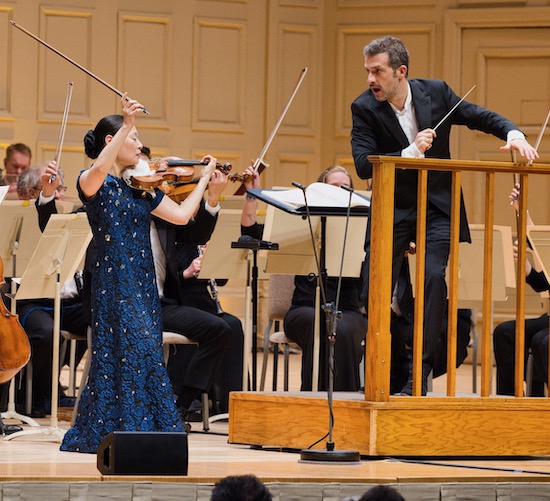Boston Symphony returns with worthy podium debut and mixed Tchaikovsky

Midori performed Tchaikovsky’s Violin Concerto with Omar Meir Wellber conducting the Boston Symphony Orchestra Thursday night at Symphony Hall. Photo: Hilary Scott
If it seems like a lot of time has transpired since the Boston Symphony Orchestra last put in a local appearance, that’s because it has. Between their November tour of Japan and the Pops’ December season, the ensemble has offered just one truncated concert series in town in the past nine weeks.
Given that the only other major news out of Symphony Hall in that time concerned the unexpected resignation of BSO president Gail Samuels, Thursday night’s return to the stage was especially welcome. For the event, the BSO brought in one bona fide heavy hitter, the violinist Midori, and the up-and-coming conductor Omer Meir Wellber, who was making his Boston debut.
The 41-year-old Israeli maestro cuts a dynamic, if blunt, presence. His gestures illustrate in boldface exactly what’s going on in the music: sweeping arm curlicues and ecstatic jumps for fortissimo attacks, crouching into a ball for pianissimos. When the music starts to dance, so does Wellber.
These antics aren’t always pleasant—or comfortable— to watch. But, on Thursday, they were largely effective. The BSO rarely returns from its year-end hiatus in prime form. It wasn’t quite there yesterday but that so little rust showed owed more than a little to the man on the podium.
The night’s offerings, especially its second half, played to Wellber’s theatrical sensibilities. (He is an established opera conductor as well as a published novelist.) In that part, Ella Milch-Sheriff’s monodrama The Eternal Stranger was paired with two pieces by Beethoven: the second movement of the “Eroica” Symphony and the Leonore Overture No. 3.
While such programming might exasperate purists, the concept is secure. Milch-Scheriff’s score was composed for the Beethoven semiquincentennial in 2020. Setting an adaptation of Joshua Sobel’s poem “The Wandering of the Eternal Refugee and the Fight Against Despair,” it seeks to draw a connection between Beethoven—here held to be a social outcast on account of his deafness and irascible personality—and the plight of refugees the world over.
That’s a tenuous tie-in: while Beethoven’s disability certainly rendered him a social “other,” he was neither homeless nor neglected. The text’s references to one who loves humanity and nature (it never mentions Beethoven by name) are on a surer footing, enough to draw the necessary parallel that musical communication can succeed where and when words fail.
Milch-Sheriff’s writing in The Eternal Stranger is broadly accessible and often evocative of the Middle East (one of the work’s inspirations is a letter where Beethoven recounted a dream in which he travelled to Arabia). Whether depicting nightmarish visions or building to its rhythmically driven denouement, the effort unfolds fluently and is freshly scored.
The employment of the text, though, is problematic. Much of it is set rhythmically and, between a periodically sing-song cadence and seemingly random repetitions of phrases, frequently feels stilted.
On Thursday, actor Eli Danker delivered his lines securely, but he was hampered by muddled amplification (there were no supertitles or printout of the libretto in the program booklet) that, in turn, rendered the subtleties of his larger performance moot.
Wellber drew playing of compelling security and shape from the BSO. Cathy Basrak dispatched the viola solos brilliantly while the melismatic woodwind writing beguiled.
Similarly striking were the Beethoven excerpts, which flowed without pause from the Milch-Sheriff into one another.
True, the conductor’s approach to the great “Marcia funebre” mightn’t have been the edgiest or most revelatory on record. But, for warmth, dynamic range, play of contrasts, and—in the fugal sequence—stereophonic awareness (violins split à la James Levine) it held the ear.
His take on the third Leonore Overture was likewise arresting for its spatial clarity—the climactic trumpet calls emanated, thrillingly, from high in Symphony Hall’s second balcony—and speed. To be sure, clocking in at twelve minutes, this was a brisk reading. But it rarely felt frantic or failed to dance when it needed to.
If only such qualities consistently applied to the Tchaikovsky Violin Concerto that opened the evening.
At least there’s no question that, at 51, Midori remains a formidable violinist. Her ability to toss off notes effortlessly in this most virtuosic of concerti is nothing short of astonishing. So is the ease with which she projects her part: not once was her tone forced, sound pinched, or instrument covered.
All the same, Thursday night’s was a strangely impersonal and literal account of this favorite, one that suggested that mere pyrotechnics could compensate for probing emotional insights. Not that it entirely lacked the latter: the “Canzonetta” was the picture of delicacy and lyricism.
But, too often, Midori’s playing simply barreled ahead, regardless of what was going on around it. While, admittedly, there was something engrossing about this tack—the drive to the first movement’s coda was blistering and I’ve never heard the end of the finale taken at a faster clip00her reading was fundamentally mechanical and breathless.
Perhaps this was best illustrated by a moment in the last bucolic section of the Allegro vivacissimo, where the virtuoso, dashing ahead momentarily fell out of sync with Wellber and the BSO, who were making an attempt to absorb the rustic view. Eventually, everything came back together, the desired result was achieved, and Thursday’s audience was rewarded with an encore: a feather-light but frenetic run-through of the Prelude from Bach’s E-major Partita.
The program will be repeated 1:30 p.m. Friday and 8 p.m. Saturday at Symphony Hall. bso.org
Posted in Performances



